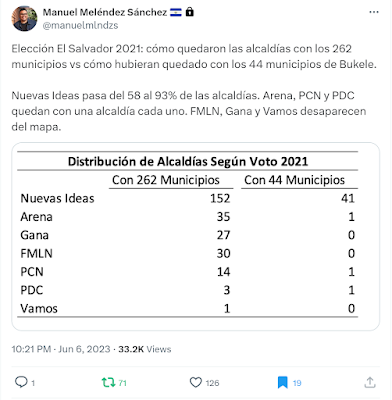Sunday's municipal elections
On Sunday March 3, Salvadorans will go to the polls for the second set of national elections in a month. In these elections, Salvadorans will elect their mayors and will elect deputies of the Central American Parliament. (PARLACEN).
Three years ago Salvadorans elected mayors in 262 different municipalities. However, in a measure passed 8 months ago, the Legislative Assembly consolidated those 262 municipalities into only 44 municipalities at the directive of Nayib Bukele. The old municipalities are now "districts" within the 44 new mega-municipalities which have memorable names like San Salvador East and La Libertad South.
The new municipalities and the districts which make them up are shown at this link.
This reduction in the number of local government bodies was gerrymandering on a dramatic scale. One analyst portrayed the impact of the change using results from the last elections in 2021.
But there is a counter-vailing force in this weekend's elections -- the Salvadoran public is broadly dissatisfied with the performance of their current municipal governments. An opinion poll by FundaUngo in November 2023, published in January 2024, made this quite clear.
57.6% of respondents rated the work of their local governments as bad or very bad:
These poll results are telling when you realize that 58% of the local governments are headed by Bukele's Nuevas Ideas party. The dissatisfaction revealed in the poll results may indicate that, when it comes to the very local things which touch people's daily lives in their communities, the powerful publicity machine of Nuevas Ideas may not be as effective as in the national elections.
One of the more interesting municipal elections on Sunday matches Milagro Navas, the long-time ARENA mayor of Antiguo Cuscatlán, a suburb of San Salvador, against Michelle Sol, Bukele's Minister of Housing. They are competing for the seat of mayor of La Libertad East, a new municipality composed of Antiguo Cuscatlán, Nuevo Cuscatlán, Zaragoza, Huizucar and San Jose Villanueva. Milagro Navas, who uses pink as her color as a female mayor (even the garbage trucks are painted pink) has long kept the business community and her middle and upper class residents happy by making sure things work. Michelle Sol is one half of a power couple in Salvadoran politics -- she is married to the president of the Legislative Assembly, Ernesto Castro. A long time associate of Bukele, she became the FMLN mayor of Nuevo Cuscatlán in 2015 after Bukele left that position to become mayor of San Salvador. Sol won re-election, again as an FMLN candidate in 2018, and then joined Bukele's cabinet as Minister of Housing in 2019. (Sol today campaigns as a candidate of Nuevas Ideas).
Navas has been campaigning hard, and appears to have a well-financed campaign. Sol refused Navas' challenge to debate, claiming debates were part of the "politics of the past." It's not clear how much clout Navas will have outside of Antiguo Cuscatlán -- after all, Nayib Bukele lives in Nuevo Cuscatlán, another important part of this new mega-municipality.
Another aspect to watch in the municipal elections is whether or not the Supreme Electoral Tribunal ("TSE") can actually manage to pull off an election without system failures and chaos. The presidential and legislative elections a month ago were widely criticized by independent observers for the domination of the process by Nuevas Ideas, for failures in the system for tallying and communicating preliminary results, and for two weeks of scrutinizing legislative ballots which uncovered scores of irregularities. Despite this, the president of the TSE proclaimed, in a formal event this week where she delivered a certificate of election to Bukele, that everything in the February 4 electoral process was "normal and organized" and in full compliance with the law. The TSE has never publicly explained why its system for early election results failed on February 4, why March 3 will be different, or how it evaluated all of the irregularities complained of in the final vote count for Legislative Assembly.
I almost forgot. There is also the election of deputies to PARLACEN. In 20 years of covering El Salvador, I have never seen the Central America parliament do anything noteworthy. As far as I can tell, the main reason to aspire to a seat in PARLACEN is to obtain immunity from prosecution while you hold the seat. (That will be the extent of my writing about PARLACEN for this year).




Comments